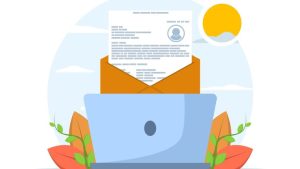6 Data-Driven Tips for Writing a Targeted Cover Letter
 Publié le 13 May 2024
Publié le 13 May 2024
Stand out to a hiring manager by using 6 data-driven tips for writing a targeted cover letter.
When you’re looking for jobs, it can sometimes feel almost impossible to keep on sending out applications just to receive rejection after rejection. That’s why you should do everything you can to make sure that your cover letters – which 72% of recruiters expect to receive – are as effective as possible.
A great way to do this is by putting yourself in the shoes of a hiring manager. They want to find the ideal candidate as much as you want the job – so why not target your cover letter specifically to show how you align with their idea of the perfect candidate?
In this article, we’ll explain what we mean when we talk about a targeted cover letter and why they’re a brilliant way to make your application stand out. In addition to this, we’ll give you some of our top data-driven tips for writing a targeted cover letter. To learn everything there is to know about targeting your cover letters, keep on reading.
What is a targeted cover letter?
The basic principle that lies behind the idea of writing a targeted cover letter is that your cover letter should be clearly linked to the job that you’re applying to. This makes perfect sense – for example, why would you show that you know about creating a convolutional layer in deep learning if you’re applying to a role unrelated to computer science?
Ultimately, you should think of a cover letter as a fairly basic test. The hiring manager reading your application will be looking for certain criteria that you need to meet. Instead of just writing a cover letter and hoping for the best, a targeted letter is one that is perfectly designed to meet these tests.
Free to use image sourced from Unsplash
This is achieved by ensuring that your letter aligns with the key experiences and transferable skills that the recruiter will be looking for, as well as the overall mission statement of the hiring organization.
6 Data-driven tips for writing a targeted cover letter
All of this sounds good in theory, but if you’re looking for advice about cover letters, understanding targeted cover letters on their own isn’t enough. So, how can you make your application letter fully targeted to the specific role that you’re applying for? Here are our top tips, driven by recruitment data, for writing a targeted cover letter to prospective employers:
- Make sure it is addressed correctly
When you’re job hunting, it might seem simpler to just create a blanket cover letter that you can easily use for any job that you apply to. You might even use an AI tool to construct this letter, meaning that the whole process of applying for jobs can seem deceptively simple.
However, this type of generic letter can sometimes lead to embarrassing errors, such as addressing the application letter to the wrong person or business entirely!
If you’re a hiring manager looking through dozens of different applications, this type of letter is almost certainly going to be the first one to go. Applicants simply won’t look like they are committed or motivated to win the job if they don’t address it correctly.
To avoid this, you should trawl through the job advertisement or business information page to find who to address your cover letter to. If you’re unsure who to address it to, you might want to get in touch directly – which will also allow you to build an initial relationship with the organization.
- Identify the relevant skills …
Free to use image sourced from Unsplash
Every job opening that is being advertised will have a list of essential and desirable skills that the recruiter will be comparing your cover letter and application to. This is the part of the process that is most like a test – shortlisting will take place according to the extent to which your letter meets their criteria before you even get to a formal skills assessment.
Therefore, it’s worth taking the time to identify the relevant skills that potential employers are looking for. Start with the skills that are specific to the job that you’re applying to – a data engineer might need to have skills in pipeline orchestration, for example. Identifying this sort of technical skills are crucial if you want to target your cover letter effectively.
In addition to this, look through the job posting for the soft skills that the organization is looking for. These are usually stuff like communication skills or the ability to work as a team, on top of other transferable skills. They will often be clear in the job advertisement if you look carefully enough.
- … and provide evidence that you have these skills!
Once you’ve identified the key skills that your future employers are looking for, you should make a list of these. This will allow you to easily think about how you can provide evidence that you have all of thes key skills. While there will usually be more space to do this later in the application process, this can be really impactful in a cover letter if you keep it short and relevant.
This evidence should be measurable and clear to someone who isn’t necessarily an expert in your field – try to ensure that anyone will be able to read this section of your cover letter and recognize you have the right skills for the job.
Free to use image sourced from Unsplash
To make this easier, you should do this for some common skills that will feature in almost all job advertisements. Research shows that recruiters see communication, data analysis and strategy as some of the most important skills for the future, so think about how you can prove that you have these skills before you start searching for specific jobs.
However, the crucial thing to remember is that this needs to be a targeted cover letter. If any of the skills that you can provide evidence for aren’t mentioned in the job advertisement, then leave it out.
- Show impact
When it comes to briefly outlining your industry experience and your evidence of skills, you should always show your tangible impact. This is attractive to recruiters because they want someone who can make a positive impact on their organization.
Think about your achievements and consider how they can link to the job that you’re applying to. If you developed an effective contact rate formula, show this off and explain how it is relevant to the job posting. This combination of impact and relevance is the key to a strong targeted cover letter.
- Align your values
One of the biggest benefits of using targeted cover letters rather than cover letter templates is that it allows you to show how you align with the values of the organization that you’re hoping to join. Hiring managers aren’t just looking for someone who has the right technical skills to work in the role; instead, they’re trying to find someone who is the right fit for the employee group.
You should explain what motivated you to apply to this specific role and business – this needs to be much more than salary or employee benefits! Connect your own values or preferences with those of the company, which should be evident through channels such as social media, marketing materials, or the job advertisement itself.
Free to use image sourced from Unsplash
Another great way to show that you are aligned with the values, motivations and priorities of the hiring organization is by having clearly done your research on the company. You might want to name a specific initiative that the organization has recently done so that they know that you’re genuinely interested in working at the company.
- Be clear and forthright
You should always remember that the hiring managers who read your cover letters are very busy people who will often read dozens of cover letters a day. Therefore, clarity should be one of the most important goals when it comes to writing a targeted cover letter.
Targeting your writing can help you to make it clearer. You might know that the organization that you’re applying to is expanding into data for the first time, for example. If this is the case, it is likely that a non-expert will be reviewing your letter, so there’d be no point in using jargon or technical case studies like a snowflake schema example.
This sort of clarity should also extend to your own personal situation. You might want to include information about your notice period and when you’d be able to start working to show just how dedicated you are to this specific role.
Targeted cover letters – the route to job hunting success
Free to use image sourced from Unsplash
With 83% of recruiters agreeing that cover letters are necessary for job hunters, a well-written cover letter can make you the perfect candidate, whether you’re applying for marketing roles, data jobs, or whatever takes your fancy.
That’s why crafting a targeted cover letter – an application letter that is specific and targeted to each job that you apply to – can be so effective, as it really shows that you’re the right person for the job.
By using our 6 data-driven tips for writing a targeted cover letter, you can make sure that you’re in the best possible position to find job-hunting success today!







